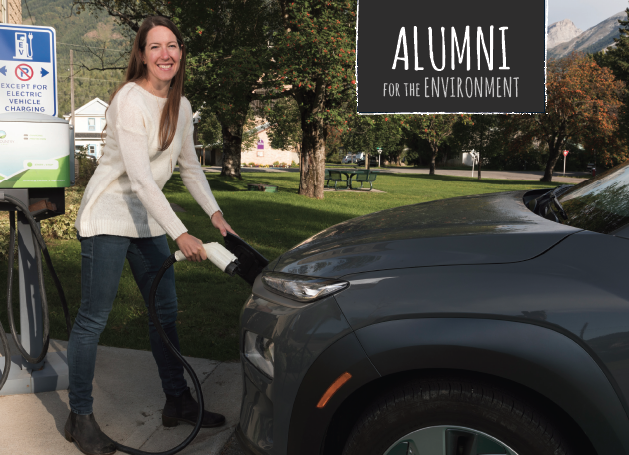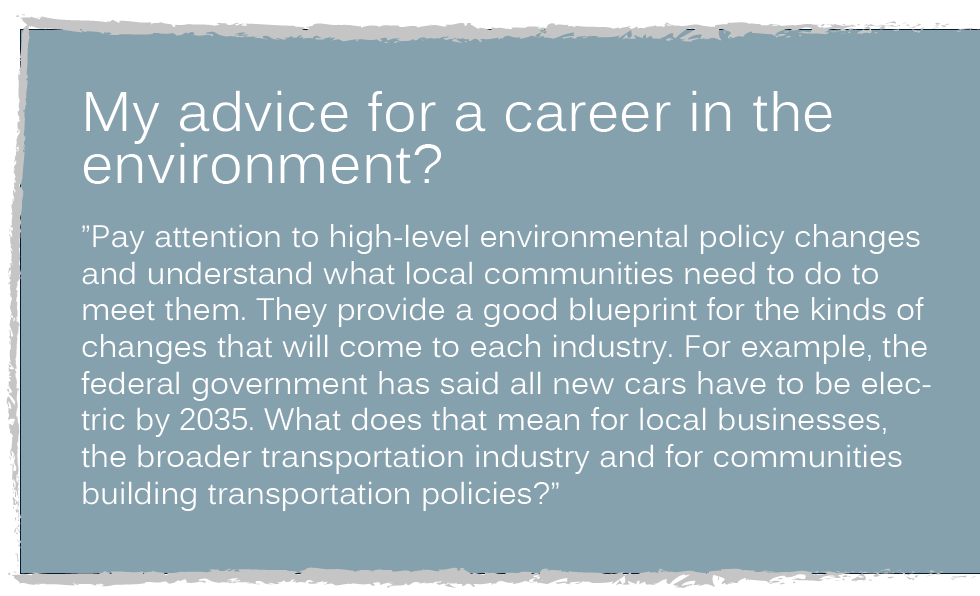
Standing in front of an organization representing 40 communities in southern Alberta, Megan Lohmann wanted to show how a network of 20 fast-charge electric vehicle stations across their region would bring a raft of benefits.
Megan is the Director of Strategic Initiatives for the Community Energy Association (CEA), a Vancouver-based NGO that consults and advises local governments and Indigenous communities to put in place policies, infrastructure and programming supporting climate action and energy efficiency. Operating from Fernie, BC, her job is to identify projects that will deliver the greatest impact on emission reduction, and to connect the experts and suppliers that will make them successful and cost-efficient.
In this case, she made her case in a series of workshops pointing to an opportunity to rebrand the region in a new way, encouraging tourism – because electric vehicle tourism is becoming a compelling strategy – as well as leading-edge thinking toward economic development that would soon be required regulation federally and provincially.

As it turned out, the region had an existing wind resource and Megan and the CEA were able to make sure every unit of power used by the recharging stations was matched by the power generated locally. “So the project played to the strengths of the region, taking advantage of local renewable energy resources to help make the transition to low-carbon vehicle traffic throughout the area,” says Megan.
While the benefits may seem obvious in retrospect, the challenge is that the technologies are frequently new or unfamiliar, and the most ecologically beneficial solution hasn’t been considered before or may be prematurely viewed as costly. “The most difficult aspect of my job is to present a new opportunity to organizations that have the potential for a lot of impact but have never done anything like it,” Megan explains. “It’s something that hasn’t been on their radar before.”
Clearly, this takes a certain amount of confidence with facts – and a measure of determination and patience. “Luckily, I’m quite stubborn and very committed to the long game,” Megan says with a smile. “I understand that it’s worth it and very necessary. I’m willing to let it take three, four or five years to see a high-impact project come to fruition. You have to look strategically at longer-term opportunities and tackle them with full force.”
EV installations are important for small communities because those that don’t have them become barriers to investment and travel. Megan also works often in residential and small and medium-sized commercial construction and renovation projects, focusing on trades and contractors to make them aware of ways to improve energy-efficiency. Colleges and educators are also key collaborators for her work.
As the one responsible for recommending solutions, identifying experts and managing requests for proposals and equipment procurement, she has had to learn the fine details of these technologies and trades. “In 15 years, energy technologies have evolved quite a bit,” she says. “I’ve had to evolve my own knowledge and education, but it’s been great to get in early on areas that are developing quickly with a lot of impact.”
Megan credits much of this dedication to the environment – and many of the skills she uses to serve it – to Lakefield. Her father, David Walsh, was a teacher and housemaster at LCS so she was one of those little ones seen around campus.
“I was immersed in that natural environment and the outdoor lifestyle from an early age,” she says. “Later, as a student, I remember the emphasis on hands-on experience, like the Algonquin Park trips and the outdoor education. But whatever we did, there was always an expectation that we can do more, that we can effect change. It requires a level of confidence and leadership to go to these communities and convince them that they can also do more. LCS directly contributed to my ability to do that.”
From Lakefield, Megan studied environmental science at the University of Guelph and then took a Masters of Science in Environment and Management at Royal Roads University. As part of her studies, she worked on a summer project examining contaminated soils in small communities in Nunavut. “That was when my trajectory shifted from land-based concerns to climate,” she says. “Talking to Inuit people, I learned about the effects of climate change on their food sources, travel and on the permafrost. The effects of climate change are accentuated in the north, so they are the canaries in the mineshaft. It will happen to all communities eventually.”
This realization was a turning point in Megan’s career. After graduation, living in Kingston, Ont., the city began searching for a consultant to help design a climate action plan. “Not many communities were doing that at the time, and I bid on the contract – and won it,” she says. Later, having moved to Fernie, BC, with her husband, she began pitching local climate action plans around BC at the same time as the provincial government began implementing policies requiring communities to have them. With perfect timing, she became increasingly busy – and successful – as a consultant.
“It was great experience in adapting and framing a message in a language that your listeners will understand and respond to,” says Megan. Later, landing with the CEA made effective use of all these skills. “It’s extremely challenging and also rewarding. You have the opportunity to really make a difference, working at a level that is not the status quo and presses forward toward a better future.”
Written by: John Southerst
